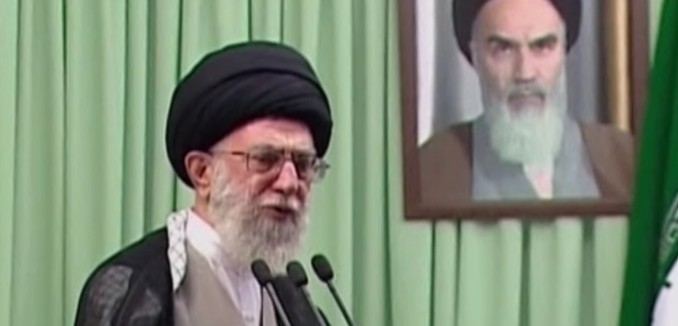The sanctions relief accompanying a potential nuclear deal with Iran will result in significant financial benefits to Supreme Leader Ayatollah Ali Khamenei and his Islamic Revolutionary Guard Corps (IRGC), according to research published Wednesday in The National Interest. The study is by Emanuele Ottolenghi and Saeed Ghasseminejad, respectively a senior fellow and an associate fellow at the Foundation for Defense of Democracies.
Ottolenghi and Ghasseminejad came to their conclusion by using the stock market valuations of Iranian companies to estimate how much of Iran’s economy is controlled by Khamenei and the IRGC.
While it is true that in 2005, the Supreme Leader launched a large privatization drive, mandating the government to sell most state-owned industries, the program did not exactly empower the country’s fledgling private sector. Its main beneficiaries were foundations controlled by the Islamic Republic’s deep state, including the military, especially the Revolutionary Guards and Khamenei. One can speculate about how dominant the economic position of these entities in the Iranian economy is. But there is no question that the IRGC, owing to this “privatization,” has gained significant influence over Iran’s economy and its political system….
We have been tracking the intervention of military foundations—both the Guard Corps’ and the armed forces’—into Iran’s stock market (the Tehran Stock Exchange) since 2011. Military-controlled companies are mostly concentrated in strategic sectors such as oil, mining, telecommunications, petrochemicals, automotive, banking and construction.
As of April, the portfolio of military foundations consisted of twenty-six publicly-traded firms with a market value of 17.5 billion dollars—almost 20 percent of Tehran’s Stock Exchange market value. The Supreme Leader’s business empire accounts for an estimated additional 5 percent through three foundations he controls: Setad Ejraiye, the Foundation of the Oppressed and Disabled (or Mostazafan Foundation) and Rey Group. We estimate that together, they control one fourth of the stock exchange.
Ottolenghi and Ghasseminejad used strict criteria of ownership to reach their conclusion. However, they pointed out that even companies that don’t meet their standards for being owned by Khamenei or the IRGC may still effectively be controlled by them. They also observed that the vast assets Khamenei and the IRGC control are not traded on the Tehran stock exchange, so using the stock market as an indicator of their share of Iran’s economy probably understates how much of the economy they control.
Knowing the extent of Khamenei and the IRGC’s involvement in the economy is important, they wrote, “especially for those who believe that any coming postsanctions boom will diversify Iran’s politics and strengthen the ever-elusive Iranian party of moderation.”
They concluded:
Privatization has largely benefited Iran’s deep-state—the ubiquitous military-industrial complex and religious foundations and holding companies close to the Supreme Leader. If a nuclear-deal windfall arrives, theses two groups will surely benefit handsomely.
[Photo: JewishNewsOne / YouTube ]




